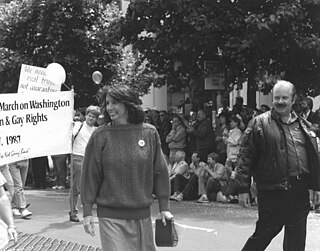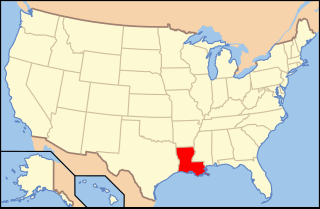Related Research Articles

Lesbian, gay, bisexual, transgender and queer (LGBTQ) movements are social movements that advocate for LGBTQ people in society. Although there is not a primary or an overarching central organization that represents all LGBTQ people and their interests, numerous LGBT rights organizations are active worldwide. The first organization to promote LGBT rights was the Scientific-Humanitarian Committee, founded in 1897 in Berlin.

Dorothy Louise Taliaferro "Del" Martin and Phyllis Ann Lyon were an American lesbian couple based in San Francisco who were known as feminist and gay-rights activists.
This is a list of notable events in the history of LGBT rights that took place in the year 1973.
This is a list of notable events in the history of LGBT rights that took place in the year 2005.
Same-sex marriage has been legally recognized in the U.S. state of Washington since December 6, 2012. On February 13, 2012, Governor Christine Gregoire signed legislation that established full marriage rights for same-sex couples in the state of Washington. Opponents mounted a challenge that required voters to approve the statute at a referendum, which they did on November 6. The law took effect on December 6, and the first marriages were performed on December 9. Within a couple of days, more than 600 marriage licenses were issued to same-sex couples in King County alone. Washington was the seventh U.S. state, and the eighth U.S. jurisdiction, to legalize same-sex marriages.

The Second National March on Washington for Lesbian and Gay Rights was a large political rally that took place in Washington, D.C., on October 11, 1987. Around 750,000 people participated. Its success, size, scope, and historical importance have led to it being called, "The Great March". It marked the first national coverage of ACT UP, with AIDS activists prominent in the main march, as well as making headlines the next day during mass civil disobedience actions at the United States Supreme Court Building.

Equal Rights Washington (ERW) is Washington’s largest statewide LGBTQ advocacy and community outreach organization. ERW's mission is to ensure and promote dignity, safety, and equality for all lesbian, gay, bisexual, and transgender Washingtonians.
Same-sex marriage has been provisionally recognised nationwide in Nepal since 24 April 2024. On 28 June 2023, Supreme Court Justice Til Prasad Shrestha directed the government to establish a "separate register" for "sexual minorities and non-traditional couples" and to "temporarily register their marriages". Despite the directive, a district court in Kathmandu denied a same-sex couple's application to marry on 13 July 2023. In the last week of November 2023, the couple was informed by the Ministry of Home Affairs that their marriage would be registered. They successfully registered their marriage on 29 November 2023 in Dordi, followed by other couples, including transgender couples, over the following months. On 24 April 2024, Home Affairs' National ID and Civil Registration Department issued a circular to all local registration authorities, instructing them to enter all same-sex marriages into the separate register. However, the temporary registration does not grant same-sex couples the same legal rights and recognition as opposite-sex couples. Same-sex couples cannot inherit property, receive tax subsidies, make spousal medical decisions or adopt children, among others. They are also labeled as "groom and bride" on marriage licenses, and it is unknown if all local governments are complying with the instructions of the National ID and Civil Registration Department.
Recorded history of the LGBT community in Seattle begins with the Washington Sodomy Law of 1893. In the 1920s and 1930s there were several establishments in Seattle which were open to homosexuals. The Double Header, opened in 1934, may have been the oldest continuously operating gay bar in the United States until it closed in December 2015. On 19 November 1958, an injunction instructed the city police not to question customers of gay bars unless there was a "good cause" in connection with an actual investigation. In the 1960s, Seattle came to be seen as providing an accepting environment, and an increasing number of gay and lesbians were drawn to the city. In 1967 University of Washington's Professor Nick Heer founded the Dorian Society, the first group in Seattle to support gay rights.

One Iowa is a statewide LGBTQ equality organization. The organization works to preserve and advance equality for LGBTQ individuals in Iowa through advocacy, grassroots efforts, and education.

Lesbian, gay, bisexual, transgender, and queer (LGBTQ) people in the U.S. state of New Jersey have the same legal rights as non-LGBTQ people. LGBT individuals in New Jersey enjoy strong protections from discrimination, and have had the same marriage rights as heterosexual people since October 21, 2013.

Forum for Equality is a Louisiana-based statewide LGBTQ civil rights advocacy group that was founded in 1989. The major focus of this group is on the political process, in which it encourages members to participate through reminders of upcoming elections, campaigns promoting awareness of legislation that affects the LGBT community, and rallies to demonstrate popular support for LGBT civil rights. The group also works to educate the LGBT community in Louisiana about the issues that affect the community as a whole. The organization is a member of the Equality Federation.

In the United States, lesbian, gay, bisexual, and transgender (LGBTQ) people have a long history, including vibrant subcultures and advocacy battles for social and religious acceptance and legal rights.

The state of Washington is seen as one of the most progressive states in the U.S. in regard to lesbian, gay, bisexual, transgender and queer (LGBTQ) rights; with jurisprudence having evolved significantly since the late 20th century. Same-sex sexual activity was legalized in 1976. LGBTQ people are fully protected from discrimination in the areas of employment, housing and public accommodations; the state enacting comprehensive anti-discrimination legislation regarding sexual orientation and gender identity in 2006. Same-sex marriage has been legal since 2012, and same-sex couples are allowed to adopt. Conversion therapy on minors has also been illegal since 2018.

LGBTQ history in the United States spans the contributions and struggles of lesbian, gay, bisexual, transgender and queer (LGBTQ) people, as well as the LGBTQ social movements they have built.
Faygele Ben-Miriam was a U.S. activist, particularly for LGBT rights, and a gay marriage pioneer, filing one of the first gay marriage lawsuits in American history after being denied a marriage license at the King County Administration Building in Seattle, Washington in 1971.
Same-sex marriage became legal in Kansas following the U.S. Supreme Court's decision in Obergefell v. Hodges on June 26, 2015, which found the denial of marriage rights to same-sex couples unconstitutional. By June 30, all 31 judicial districts and all 105 Kansas counties were issuing marriage licenses to same-sex couples or had agreed to do so. Kansas state agencies initially delayed recognition of same-sex marriages for purposes including but not limited to changing names, ascribing health benefits and filing joint tax returns, but began doing so on July 6.

Garden State Equality is a statewide advocacy and education organization in the U.S. state of New Jersey that advocates for lesbian, gay, bisexual, and transgender (LGBTQ) rights, including same-sex marriage.

This is a timeline of notable events in the history of the lesbian, gay, bisexual, and transgender community in the United States.
The National LGBTQ Wall of Honor is a memorial wall in the Greenwich Village neighborhood of Manhattan in New York City, dedicated to LGBTQ "pioneers, trailblazers, and heroes". Located inside the Stonewall Inn, the wall is part of the Stonewall National Monument, the first U.S. National Monument dedicated to the country's LGBTQ rights and history. The first fifty inductees were unveiled June 27, 2019, as a part of events marking the 50th anniversary of Stonewall. Five honorees are added annually.
References
- 1 2 3 4 5 6 7 8 9 10 Turnbull, Lornet (April 4, 2006). "Gay man sees big changes since '72 lawsuit". The Seattle Times. Archived from the original on June 25, 2023. Retrieved June 25, 2023.
- 1 2 3 4 5 Sanders, Eli (August 3, 2006). "Marriage Denied". The Stranger. Retrieved June 25, 2023.
- 1 2 3 4 5 6 7 Mcnerthne, Casey (December 13, 2012). "Seattle gay rights pioneer recalls struggle for marriage equality". Seattle Post-Intelligencer . Retrieved June 25, 2023.
- ↑ Hickethier, Rosie (May 1, 1971). "Near Tie Marks Olympic College Vote: Protest Filed". The Bremerton Sun. Vol. 72, no. 22 – via Newspapers.com.
- ↑ Marlow, Thom (January 1, 1972). "⚢ ⚣". Fed up. Tacoma, Washington: 4.
- ↑ "Gays Picket Police". Seattle Gay Liberation Front Newsletter (1): 1–3. May 1973.
- 1 2 Coleman, James; Lambiris, Dennis; Manning, Jay; Martin, Franz; Raphael, Joseph; Smith, Lee; West, Raymond (January 1, 1972). "Nuptial News". The Gay Liberator (14): 5.
- ↑ "GI bill would include them?". The Capital Journal. Seattle. UPI. September 21, 1971. p. 13 – via Newspapers.com.
- ↑ Enszer, Julie R. (2013). ""Whatever Happens, This Is": Lesbians Engaging Marriage". Women's Studies Quarterly. 41 (3/4): 210–224. ISSN 0732-1562. JSTOR 23611516.
- 1 2 3 "Homosexuals lose plea to get marriage license". The Peninsula Times Tribune. UPI. May 22, 1974. p. 4 – via Newspapers.com.
- ↑ Camden, Jim (February 13, 2022). "10 years ago today, Washington marked a milestone in marriage equality". The Spokesman-Review .